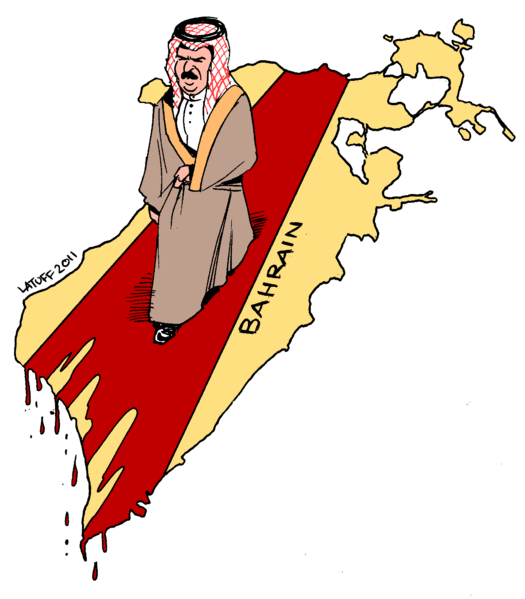
The King of Bahrain, Hamad bin Isa Khalifa, was a guest of HM Queen Elizabeth II for her Diamond Jubilee lunch at Windsor Castle on 18 May 2012. He also hosted the Formula 1 Grand Prix on 22 April 2012. Below are some interesting facts for FRFI readers.
- Education: Applegarth College, Godalming, Surrey; the Leys School, Cambridge; the British Army, Aldershot; US Army Command and General Staff College, Fort Leavenworth, Kansas, USA.
- Country: Bahrain, a British protectorate from the 1820 General Treaty of the Arab Tribes of the Persian Gulf. The British called those who resisted them ‘pirates’ and their homelands the ‘Pirate Coast’. Further anti-pirate treaties followed in 1843 and 1853. In 1861 the Sheikh of Bahrain, confronted by Royal Navy guns, signed a treaty placing Bahrain, its trade and pearls under British control.
- Location: the Persian Gulf. 1903 Lord Curzon Viceroy of India: ‘The Persian Gulf is a British lake.’
- 1956 and 1965: British troops crushed striking Bahraini oil workers. In 1962 22,000 British soldiers were stationed in Bahrain.
- 1971 Bahrain was given formal independence. British Colonel Ian Henderson, previously employed to suppress the Mau Mau rising in Kenya, was appointed head of Bahrain’s special branch. A law was passed allowing any Bahraini to be held for three years without charge or trial on suspicion that they might be a threat to the state. Today, Bahrain’s security forces are advised by former Assistant Commissioner of the London Metropolitan Police, John Yates, and the former chief of the Philadelphia and Miami police forces, John Timoney John Yates resigned from the Metropolitan Police in 2011 following revelations of his close relationship with former News of the World editor Neil Wallis, who he hired as a public relations for the Met (see Carol Brickley, A very, very British scandal, FRFI 226 April/May 2012).
- Since 14 February 2011 at least 86 Bahraini civilians have been killed by state security forces. 2,908 have been injured during protests, five have died under torture and 1,866 detainees report being tortured. They have demanded democracy, jobs and social improvements.
- 20 medical professionals arrested for treating injured protesters were given up to 20 years imprisonment for anti-government activity. Following international protests they are to be re-tried. Medical staff have been systematically detained, kidnapped and tortured.
- On 14 March 2011 1,000 Saudi Arabian soldiers and 500 United Arab Emirates’ police entered Bahrain. The following day the King declared martial law and a state of emergency.
- 70% of Bahrain’s indigenous population is Shia Moslem. By mid-May 2012 28 mosques and other Shia religious buildings had been destroyed.
- Bahrain hosts the US Fifth Fleet. It provided bases for the attacks on Iraq and Afghanistan. In 2008 Bahrain became the first Arab country to conduct joint naval manoeuvres with the US.
- 11 May 2012: the US announced it was resuming arms sales to Bahrain; warships, missiles and jet fighter engines. US arms sales to Bahrain in the last decade are $1.4 billion. Since the protests began Britain has supplied Bahrain’s security forces with rifles, artillery and tear gas worth £1.3 million.
- Before the 22 April Grand Prix protests of 100,000 to 250,000 people were met with tear gas and live ammunition. Bernie Ecclestone, Chief Executive of Formula 1, said, ‘There’s nothing happening. I know people who live there and it’s all very quiet and peaceful.’ According to Ecclestone, fortune £4.2 billion and ranked Britain’s fourth richest person, Hitler, ‘could command a lot of people able to get things done’. ‘If you have a look at a democracy it hasn’t done a lot of good for many countries – including this one,’ he meant Britain.
Trevor Rayne




